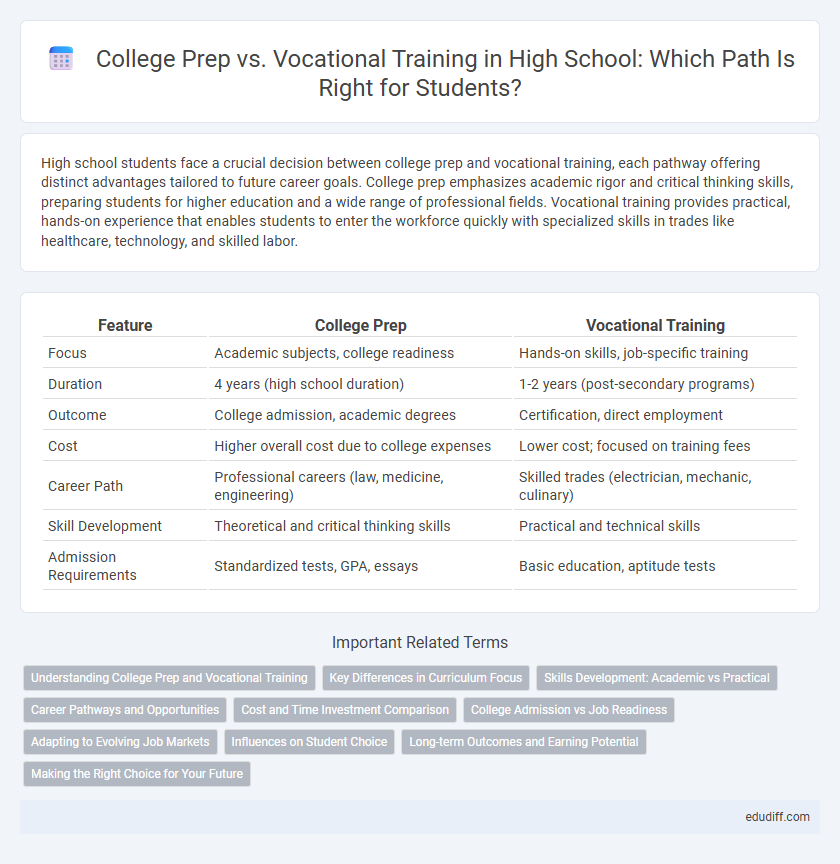High school students face a crucial decision between college prep and vocational training, each pathway offering distinct advantages tailored to future career goals. College prep emphasizes academic rigor and critical thinking skills, preparing students for higher education and a wide range of professional fields. Vocational training provides practical, hands-on experience that enables students to enter the workforce quickly with specialized skills in trades like healthcare, technology, and skilled labor.
Table of Comparison
| Feature | College Prep | Vocational Training |
|---|---|---|
| Focus | Academic subjects, college readiness | Hands-on skills, job-specific training |
| Duration | 4 years (high school duration) | 1-2 years (post-secondary programs) |
| Outcome | College admission, academic degrees | Certification, direct employment |
| Cost | Higher overall cost due to college expenses | Lower cost; focused on training fees |
| Career Path | Professional careers (law, medicine, engineering) | Skilled trades (electrician, mechanic, culinary) |
| Skill Development | Theoretical and critical thinking skills | Practical and technical skills |
| Admission Requirements | Standardized tests, GPA, essays | Basic education, aptitude tests |
Understanding College Prep and Vocational Training
College prep programs emphasize academic courses designed to qualify students for university admission, focusing on subjects like mathematics, science, and literature to build a strong foundation for higher education. Vocational training centers on hands-on skills and practical experience in trades such as automotive technology, healthcare, and information technology, preparing students for immediate employment. Both pathways offer targeted curricula that align with students' career goals and learning preferences, making it essential to understand their unique benefits and outcomes.
Key Differences in Curriculum Focus
College prep curricula emphasize advanced theoretical subjects such as mathematics, science, and literature to prepare students for university-level studies. Vocational training focuses on practical skills and hands-on experience in trades like carpentry, automotive repair, and healthcare support. The distinct difference lies in college prep aiming at academic knowledge while vocational training targets specific career skills.
Skills Development: Academic vs Practical
College prep programs emphasize academic skills development, including critical thinking, research, and advanced mathematics, preparing students for higher education. Vocational training focuses on practical skills such as technical operations, craftsmanship, and hands-on problem-solving, directly aligned with specific trades or industries. Both paths cultivate essential competencies, but college prep targets intellectual mastery while vocational training prioritizes immediate workforce readiness.
Career Pathways and Opportunities
College prep programs emphasize academic rigor and critical thinking skills, preparing students for university degrees and careers in fields such as engineering, medicine, and law. Vocational training offers hands-on experience and specialized skills in trades like automotive technology, culinary arts, or healthcare support, leading directly to employment opportunities or apprenticeships. Choosing between these pathways depends on individual career goals and the demand for skilled professionals in specific industries.
Cost and Time Investment Comparison
College prep programs often require a higher financial investment, including tuition, textbooks, and application fees, typically spanning four years of high school and subsequent college education. Vocational training programs, generally shorter in duration--ranging from several months to two years--offer a more affordable alternative with direct pathways to employment in skilled trades. The time and cost efficiency of vocational training makes it a practical choice for students seeking quicker entry into the workforce without the extended expenses associated with college preparation.
College Admission vs Job Readiness
College prep programs emphasize advanced coursework, standardized test preparation, and extracurricular activities to enhance college admission prospects. Vocational training prioritizes hands-on skills, certifications, and real-world experience to ensure immediate job readiness in fields like healthcare, technology, and trades. Students targeting competitive universities benefit from college prep, while those seeking fast entry into the workforce gain from vocational pathways.
Adapting to Evolving Job Markets
College prep programs equip students with critical thinking and advanced academic skills essential for dynamic industries like technology and healthcare. Vocational training offers specialized, hands-on expertise tailored to specific trades, rapidly aligning with labor market demands for skilled professionals in fields such as manufacturing and skilled trades. Both pathways foster adaptability, ensuring graduates can navigate evolving job markets by continuously acquiring relevant skills.
Influences on Student Choice
Family expectations and socioeconomic background significantly influence student decisions between college prep and vocational training paths. Peer groups and academic performance also shape students' preferences, often steering them toward programs perceived as more prestigious or financially rewarding. Local labor market demands and guidance counselor recommendations play crucial roles in aligning student choices with future employment opportunities.
Long-term Outcomes and Earning Potential
College prep programs often lead to higher long-term earning potential through opportunities in professional careers requiring advanced degrees. Vocational training provides quicker entry into skilled trades with competitive wages but may have a lower ceiling for income growth over time. Data shows that while both paths offer economic benefits, college graduates typically experience greater job stability and lifetime earnings.
Making the Right Choice for Your Future
Choosing between college prep and vocational training hinges on personal career goals and learning preferences, with college prep focusing on academic rigor and transferability for four-year degrees, while vocational training offers hands-on skills tailored to specific trades. High school students should evaluate future job market trends, potential earnings, and the demand for skilled labor in sectors such as healthcare, technology, or skilled trades to make an informed decision. Aligning educational paths with individual strengths and market needs ensures a more successful transition into the workforce or higher education.
College Prep vs Vocational Training Infographic

 edudiff.com
edudiff.com